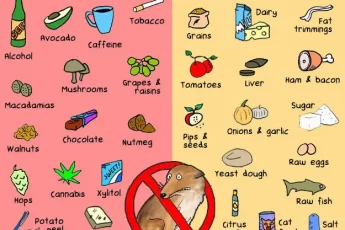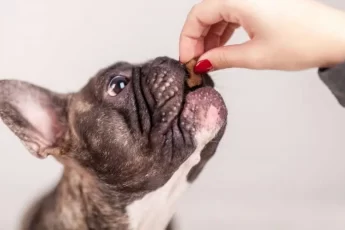French Bulldogs are known for their insatiable appetite. These adorable little dogs seem to always be on the hunt for their next meal, and it’s not uncommon to find them begging for scraps or stealing food off the table. But why are French Bulldogs always so hungry?
One reason for their perpetual hunger is that French Bulldogs have a high metabolism. This means that they burn calories at a faster rate than other breeds, and as a result, they need to consume more food in order to maintain their energy levels. Additionally, French Bulldogs have a smaller stomach capacity compared to larger breeds, so they need to eat more frequently to feel satisfied.
Another factor contributing to their constant hunger is their genetic predisposition. French Bulldogs are descended from Bulldogs, which were originally bred for bull-baiting in the 19th century. During this time, Bulldogs were known for their fierce appetite and ability to devour large quantities of food. While French Bulldogs are no longer used for bull-baiting, this genetic trait has been passed down through the generations, making them naturally inclined to eat more.
Furthermore, French Bulldogs are known for their love of food. They are notorious food enthusiasts and will eat just about anything you put in front of them. Their enthusiasm for food can be attributed to their strong sense of smell and taste, which allows them to detect even the slightest aroma of food from a distance. This, combined with their natural curiosity and desire to explore, often leads them to search for food wherever they can find it.
So, if you own a French Bulldog, it’s important to be mindful of their voracious appetite. Make sure to feed them a balanced diet and avoid giving in to their begging behavior, as this can lead to obesity and other health issues. With proper portion control and a healthy feeding routine, you can help keep your French Bulldog satisfied and prevent them from constantly searching for their next meal.
- The Appetite of French Bulldogs
- Genetic Factors
- Physical Activity Level
- Dietary Considerations for French Bulldogs
- 1. Balanced Diet
- 2. Portion Control
- 3. Nutritional Supplements
- Nutrient Requirements
- Protein
- Fat
- Carbohydrates
- Vitamins and Minerals
- Portion Control
- Common Health Issues Affecting Appetite
- Cushing’s Disease
- Diagnosis and Treatment
- Diet and Management
- Q&A
- Why are French Bulldogs prone to obesity?
- What health problems can arise from a French Bulldog’s constant hunger?
- Are French Bulldogs more food-driven than other dog breeds?
- How can I prevent my French Bulldog from constantly begging for food?
- Can I give my French Bulldog additional treats to satisfy their hunger?
- Why do French Bulldogs always beg for food?
The Appetite of French Bulldogs
French Bulldogs are known for their insatiable appetite. Despite their small size, these dogs have a big appetite and are always ready for a meal. This voraciousness can be attributed to various factors.
Firstly, French Bulldogs have a high metabolism. They burn calories quickly, which means they need to eat more frequently to maintain their energy levels. Their active lifestyle also contributes to their constant hunger.
Additionally, French Bulldogs have a genetic predisposition for overeating. This breed is prone to obesity, so they often feel the need to eat more than necessary. They may also develop a habit of begging for food, which can be difficult for owners to resist.
French Bulldogs are also known for their love of food. They have a strong sense of smell and are attracted to the scent of delicious food. This, coupled with their food-oriented nature, contributes to their constant hunger.
However, it is important for owners to manage their French Bulldogs’ food intake carefully. Overfeeding can lead to obesity and a variety of health issues. It is recommended to establish a feeding schedule and provide them with portioned meals to prevent them from becoming overweight.
In conclusion, the appetite of French Bulldogs is influenced by their high metabolism, genetic predisposition for overeating, and strong food-oriented nature. While their constant hunger may be endearing, it is important for owners to monitor their food intake to ensure their overall health and well-being.
Genetic Factors
Genetic factors play a significant role in the never-ending hunger of French Bulldogs. These adorable dogs have a genetic predisposition towards overeating and constantly seeking food.
One of the primary genetic factors that contribute to their insatiable appetite is a mutation in the leptin receptor gene. Leptin is a hormone that regulates hunger and signals the brain when the body has had enough food. However, in French Bulldogs, this receptor mutation causes resistance to the leptin hormone, leading to an inability to properly regulate their appetite.
Additionally, French Bulldogs have a slower metabolism compared to other dog breeds. This slower metabolism results from genetic variations in certain genes responsible for metabolic processes. As a result, French Bulldogs burn fewer calories and require less food to maintain their body weight. However, their genetic predisposition towards overeating counteracts this slower metabolism, leading to excessive hunger.
Furthermore, the breed’s genetics also play a role in their preference for high-calorie and tasty foods. French Bulldogs have a heightened sense of taste due to specific genes, making them more inclined to indulge in irresistible treats. This genetic factor, combined with their slower metabolism and resistance to the hunger-regulating hormone, creates a perfect storm for a constantly hungry French Bulldog.
| Genetic Factors | Description |
|---|---|
| Leptin receptor gene mutation | Causes resistance to the hunger-regulating hormone, leptin |
| Genetic variations in metabolic genes | Slower metabolism, resulting in the need for less food but countered by overeating |
| Heightened sense of taste | Increased preference for high-calorie and tasty foods |
Physical Activity Level

Physical activity plays a significant role in a French Bulldog’s overall health and well-being. These dogs have a moderate energy level, which means they require regular exercise to prevent obesity and maintain a healthy weight.
French Bulldogs love to play and engage in physical activities with their owners. They enjoy short walks, interactive play sessions, and mental stimulation exercises. However, it is important to note that they are not overly energetic dogs and do not require intense exercise or long runs.
When planning activities for your French Bulldog, consider their brachycephalic (short-nosed) nature, which can make breathing more difficult during physical exertion. Avoid activities that may cause overexertion or excessive panting, especially in hot weather.
Short, regular walks are a great way to provide physical exercise for your French Bulldog. Aim for at least 20-30 minutes of walking each day. However, keep in mind that their short snouts make them more susceptible to heat stroke, so avoid walks during the hottest parts of the day and provide plenty of water breaks.
In addition to walks, mental stimulation is essential for keeping your French Bulldog engaged and preventing boredom. Puzzle toys, obedience training, and interactive play sessions can help keep their minds sharp and their energy levels in check.
Engaging in physical activities with your French Bulldog not only helps in managing their weight but also strengthens the bond between you and your furry friend. Make sure to provide a balanced lifestyle that includes regular exercise and mental stimulation to keep them happy, healthy, and satisfied.
Dietary Considerations for French Bulldogs
French Bulldogs are known to have a big appetite, but it’s important to carefully consider their dietary needs to ensure their overall health and well-being. Providing the right balance of nutrients is key in maintaining a healthy weight and preventing obesity in French Bulldogs.
1. Balanced Diet
It is crucial to provide a balanced diet for French Bulldogs that includes a combination of high-quality proteins, healthy fats, and complex carbohydrates. A diet rich in animal protein sources such as lean meats or high-quality dog food will help support their muscle development and energy levels.
Additionally, healthy fats derived from sources like fish, flaxseed, or coconut oil can contribute to their skin and coat health, as well as providing essential fatty acids. Complex carbohydrates from whole grains, fruits, and vegetables offer a source of energy and fiber for digestion.
2. Portion Control
Due to their tendency to overeat, portion control is crucial for French Bulldogs. The feeding guidelines provided by reputable dog food brands should be followed, adjusting the portions based on your dog’s activity level and age. It’s essential to avoid overfeeding, as excess weight can lead to health issues such as breathing problems and joint pain.
Splitting their daily food portions into smaller, more frequent meals throughout the day can help prevent hunger and reduce the risk of begging or scavenging behaviors. Engaging in interactive feeding methods, such as puzzle toys or slow-feeders, can also help slow down their eating pace and prevent gulping.
3. Nutritional Supplements
While a well-balanced diet should provide most of the necessary nutrients for French Bulldogs, certain supplements can be beneficial. However, it’s important to consult with a veterinarian before introducing any supplements to your dog’s diet, as their specific needs may vary.
Common supplements that can support the health of French Bulldogs include omega-3 fatty acids for joint health and inflammation, probiotics for digestive health, and glucosamine for joint support. These supplements can be added to their diet in consultation with a vet to address specific health concerns or as a preventive measure.
Note: Always provide fresh, clean water for your French Bulldog and avoid feeding any human food that may be toxic or harmful to them.
Example of a Daily Meal Plan for a French Bulldog
| Meal | Portion Size | Food Type |
|---|---|---|
| Breakfast | 1/2 cup | High-quality dry dog food |
| Lunch | 1/4 cup | Lean chicken or turkey with cooked vegetables |
| Afternoon Snack | Small handful | Sliced fruits (e.g., apple, banana) |
| Dinner | 1/2 cup | High-quality wet dog food |
| Evening Snack | 1 tablespoon | Low-fat yogurt or a small carrot |
Remember, every French Bulldog is unique, and their dietary needs may vary. It’s important to consult with a veterinarian to create a personalized diet plan that suits your French Bulldog’s specific needs and promotes their overall health and longevity.
Nutrient Requirements
Proper nutrition is essential for the overall health and well-being of French Bulldogs. These small and compact dogs have specific nutrient requirements that should be met to ensure their growth and development are optimal.
Protein
Protein is a crucial nutrient for French Bulldogs as it provides them with the necessary amino acids for growth, maintenance, and repair of their body tissues. Good sources of protein for French Bulldogs include lean meats like chicken, turkey, and fish. It is recommended that protein makes up around 20-25% of their daily diet.
Fat
Fat is another important nutrient for French Bulldogs, as it provides them with energy and helps in the absorption of fat-soluble vitamins. However, it is essential to provide them with the right types and amounts of fat to avoid obesity. Good sources of fat for French Bulldogs include fish oil, flaxseed oil, and coconut oil.
It is recommended that fat makes up around 15-20% of their daily diet.
Carbohydrates
Carbohydrates are an important source of energy for French Bulldogs. However, it is crucial to choose complex carbohydrates rather than simple sugars. Good sources of carbohydrates for French Bulldogs include whole grains, vegetables, and fruits.
It is recommended that carbohydrates make up around 40-50% of their daily diet.
Vitamins and Minerals
Vitamins and minerals are essential for the overall health and well-being of French Bulldogs. They help support their immune system, maintain healthy bones and teeth, and promote proper growth and development. Good sources of vitamins and minerals for French Bulldogs include fruits, vegetables, and whole grains.
| Nutrient | Recommended Daily Intake |
|---|---|
| Vitamin A | 5,000 IU |
| Vitamin D | 400 IU |
| Vitamin E | 30 IU |
| Calcium | 1.5-2.5 grams |
| Phosphorus | 1-1.6 grams |
It is important to note that these are general recommendations for French Bulldogs. Individual dogs may have specific dietary needs based on their age, weight, activity level, and any underlying health conditions. It is always best to consult with a veterinarian to determine the specific nutrient requirements for your French Bulldog.
Portion Control
Portion control is a key factor in managing the hunger levels of French Bulldogs. Due to their small size and tendency to overeat, it is important to control the amount of food they consume.
1. Feeding Schedule: Establishing a regular feeding schedule can help prevent overeating. Divide the daily recommended amount of food into two or three meals throughout the day. This will help keep your French Bulldog satisfied and reduce the likelihood of constant hunger.
2. Measuring Cups: Use measuring cups to accurately portion your French Bulldog’s food. This ensures that you are not overfeeding or underfeeding your pet. Follow the feeding guidelines provided by your veterinarian or pet food manufacturer to determine the appropriate portion size.
3. Treats in Moderation: While treats can be a great way to reward and train your French Bulldog, it is important to use them in moderation. Treats should not account for more than 10% of their daily food intake to prevent excessive calorie intake and weight gain.
4. Consult with your Veterinarian: If you are unsure about the appropriate portion size for your French Bulldog, consult with your veterinarian. They can provide personalized recommendations based on your pet’s age, weight, activity level, and overall health.
By practicing portion control, you can ensure that your French Bulldog is receiving the appropriate amount of food to maintain a healthy weight and avoid constant hunger. Remember to monitor their weight and adjust their portion size as needed to prevent obesity and promote overall well-being.
Common Health Issues Affecting Appetite

1. Dental Problems: French Bulldogs are prone to dental issues such as gum disease, tartar buildup, and tooth decay. These problems can make eating uncomfortable, leading to a decreased appetite.
2. Respiratory Issues: French Bulldogs have a brachycephalic or short-nosed breed, which can result in respiratory problems. Breathing difficulties can make eating a tiring activity, causing them to eat less or lose interest in food.
3. Allergies and Food Sensitivities: French Bulldogs can develop allergies or food sensitivities to certain ingredients in their diet. These allergies can lead to gastrointestinal issues and appetite loss.
4. Intestinal Parasites: Infestations of intestinal parasites can cause gastrointestinal problems, including decreased appetite. It’s essential to regularly deworm French Bulldogs to prevent these issues.
5. Gastrointestinal Disorders: French Bulldogs can be prone to gastrointestinal disorders, such as gastritis or inflammatory bowel disease. These conditions can cause nausea, vomiting, and loss of appetite.
6. Pancreatitis: French Bulldogs are susceptible to pancreatitis, which is an inflammation of the pancreas. This condition can cause abdominal pain, vomiting, and reduced appetite.
7. Liver Disease: French Bulldogs can develop liver disease, which can impact their appetite. Symptoms may include jaundice, weight loss, and vomiting.
8. Hormonal Imbalances: Hormonal imbalances, such as hypothyroidism or Cushing’s disease, can affect a French Bulldog’s appetite. These conditions can cause weight gain or loss and changes in appetite.
9. Stress and Anxiety: French Bulldogs are sensitive dogs and can experience stress and anxiety, which can impact their appetite. Changes in their environment, routine, or social interactions can affect their eating habits.
10. Medications: Certain medications prescribed to French Bulldogs can have side effects that affect their appetite. It’s important to monitor their eating habits when starting any new medication.
It’s crucial to address any changes in appetite in French Bulldogs and consult a veterinarian if necessary. They can help diagnose and treat any underlying health issues and develop a proper diet and feeding plan for your Frenchie to ensure they stay healthy and happy.
Note: This article is for informational purposes only and is not a substitute for professional veterinary advice.
Cushing’s Disease
Cushing’s Disease, also known as hyperadrenocorticism, is a condition that affects dogs and can lead to increased hunger. It occurs when the adrenal glands produce excessive amounts of cortisol, a hormone that regulates metabolism, immune response, and stress levels in the body.
This disease can affect any breed of dog, including French Bulldogs. However, it is more commonly seen in certain breeds, such as Poodles, Dachshunds, and Terriers. The exact cause of Cushing’s Disease is not always known, but it can be caused by an overproduction of cortisol by the adrenal glands or by the prolonged use of corticosteroid medications.
Symptoms of Cushing’s Disease can vary, but increased hunger and weight gain are common signs. Other symptoms may include excessive thirst and urination, lethargy, hair loss, muscle weakness, and a pot-bellied appearance. If you notice any of these symptoms in your French Bulldog, it is important to consult with a veterinarian for diagnosis and treatment options.
Diagnosis and Treatment
To diagnose Cushing’s Disease, a veterinarian may perform blood tests to measure cortisol levels in the dog’s body. They may also recommend imaging tests, such as ultrasounds or X-rays, to evaluate the adrenal glands or other organs for any abnormalities.
Treatment for Cushing’s Disease depends on the underlying cause and severity of the condition. If the disease is caused by an overproduction of cortisol by the adrenal glands, medication may be prescribed to help regulate hormone levels. In some cases, surgery may be recommended to remove any tumors or adrenal masses that are causing the excessive cortisol production.
It is important to work closely with your veterinarian to develop a treatment plan that is tailored to your French Bulldog’s specific needs. Regular monitoring and follow-up appointments may be necessary to evaluate the effectiveness of treatment and make any necessary adjustments.
Diet and Management
In addition to medical treatment, managing a French Bulldog with Cushing’s Disease may involve dietary changes. Your veterinarian may recommend a low-fat diet that is high in fiber to help manage weight gain and support digestive health. They may also suggest feeding smaller, more frequent meals to help satisfy the increased hunger while preventing overeating.
It is important to monitor your French Bulldog’s weight and body condition closely, as obesity can worsen the symptoms of Cushing’s Disease. Regular exercise can also be beneficial, but it is important to consult with your veterinarian to determine an appropriate exercise plan for your dog.
| Symptoms of Cushing’s Disease | Diagnostic Procedures | Treatment Options |
|---|---|---|
| Increased hunger | Blood tests | Medication |
| Weight gain | Imaging tests | Surgery |
| Excessive thirst and urination | ||
| Lethargy | ||
| Hair loss | ||
| Muscle weakness | ||
| Pot-bellied appearance |
Q&A
Why are French Bulldogs prone to obesity?
French Bulldogs are prone to obesity due to their genetic predisposition and their love for food. They have a slow metabolism, which means they burn calories at a slower rate than other dog breeds. Additionally, French Bulldogs have a strong appetite and are known to beg for food. It is important for owners to monitor their Frenchie’s diet and ensure they are receiving the appropriate portion sizes to prevent obesity.
What health problems can arise from a French Bulldog’s constant hunger?
A French Bulldog’s constant hunger can lead to various health problems. Obesity is a common issue among French Bulldogs, which can put strain on their joints and increase the risk of heart disease, diabetes, and respiratory problems. Overeating can also lead to gastrointestinal issues, such as bloating and stomach ulcers. It is crucial to regulate a French Bulldog’s diet to avoid these potential health complications.
Are French Bulldogs more food-driven than other dog breeds?
French Bulldogs are known for being food-driven and having a strong appetite. While individual dogs within any breed may vary in their food drive, French Bulldogs in general tend to be highly motivated by food. This can be attributed to their genetic makeup and their history as companion dogs. French Bulldogs were traditionally bred to be close companions to humans, and their desire for food often stems from their strong bond with their owners.
How can I prevent my French Bulldog from constantly begging for food?
To prevent your French Bulldog from constantly begging for food, it is important to establish a consistent feeding schedule and stick to it. Avoid giving them table scraps or treats throughout the day, as this can reinforce the begging behavior. Instead, provide them with appropriate portion sizes during their scheduled meals and avoid giving in to their begging. Engaging your Frenchie in other activities, such as playtime or training, can also help redirect their focus away from food.
Can I give my French Bulldog additional treats to satisfy their hunger?
While it may be tempting to give your French Bulldog additional treats to satisfy their hunger, it is important to be mindful of their overall diet and calorie intake. French Bulldogs have a tendency to gain weight easily, so it is crucial to provide them with a well-balanced diet that meets their nutritional needs without overfeeding them. It is recommended to consult with a veterinarian to determine the appropriate amount of treats and snacks your Frenchie can have without compromising their health.
Why do French Bulldogs always beg for food?
French Bulldogs have a naturally strong appetite due to their genetics. They have a tendency to beg for food because they are always hungry and have a hard time feeling satisfied. It is important for owners to establish a consistent feeding schedule and avoid giving in to their begging behavior to prevent obesity and other health issues.








